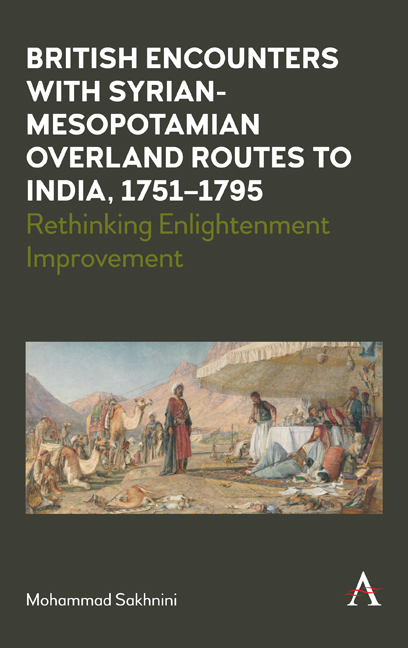 British Encounters with Syrian-Mesopotamian Overland Routes to India, 1751-1795
British Encounters with Syrian-Mesopotamian Overland Routes to India, 1751-1795 Book contents
- Frontmatter
- Contents
- Acknowledgment
- Introduction: Pluralising The Enlightenment: Improvement And Cross-Cultural Encounters
- Chapter One Improvement of Knowledge: John Carmichael’s A Journey From Aleppo to Busserah, Over the Desert (1772)
- Chapter Two Polite Englishman in the East: Edward Ives’s Journey from Persia to England (1773)
- Chapter Three Commerce, Virtue and Improvement: Abraham Parsons’s Travel in Asia and Africa (1808)
- Chapter Four Henry Abbott: A Cosmopolitan in Cities and Deserts
- Chapter Five Eyles Irwin’s Travels: The Politics of Adventure in the Levant
- Chapter Six Political and Moral Improvement: Donald Campbell, A Journey Overland to India Partly by A Route Never Gone Before by Any European (1795)
- Conclusion
- Unpublished Manuscripts
- Reference List
- Index
Chapter Four - Henry Abbott: A Cosmopolitan in Cities and Deserts
Published online by Cambridge University Press: 15 November 2023
- Frontmatter
- Contents
- Acknowledgment
- Introduction: Pluralising The Enlightenment: Improvement And Cross-Cultural Encounters
- Chapter One Improvement of Knowledge: John Carmichael’s A Journey From Aleppo to Busserah, Over the Desert (1772)
- Chapter Two Polite Englishman in the East: Edward Ives’s Journey from Persia to England (1773)
- Chapter Three Commerce, Virtue and Improvement: Abraham Parsons’s Travel in Asia and Africa (1808)
- Chapter Four Henry Abbott: A Cosmopolitan in Cities and Deserts
- Chapter Five Eyles Irwin’s Travels: The Politics of Adventure in the Levant
- Chapter Six Political and Moral Improvement: Donald Campbell, A Journey Overland to India Partly by A Route Never Gone Before by Any European (1795)
- Conclusion
- Unpublished Manuscripts
- Reference List
- Index
Summary
We have obligation to others, obligations that stretch beyond those to whom we are related by the ties of kith and kin, or even more formal ties of a shared citizenship.
—Kwame Anthony Appiah, Cosmopolitanism: Ethics in the World of Strangers (2015)Henry Abbott was born in 1764 in Pera, a suburb of Constantinople, to a well-to-do family of expatriated merchants and consuls, among whom he was brought up in Ankara and Aleppo before moving to India. Abbott lived and worked in India between 1785 and 1802. He died in Blackheath, Kent, on 12 February 1820, age 55. In Calcutta, he married Margaret Welsh, the daughter of William Welsh of Edinburgh, with whom he had several children, all of whom were influential in the British military and diplomatic service in the East. His son James Abbott (1807–1896) served as the deputy governor of the district of Hazara in North-West India. Fredrik Abbott (1805–1892) joined a British military regiment, the Bengal Engineers, in 1823 and fought in the first Burmese War (1824–1826). Saunders (1811–1894) and Augustus (1804–1867) served in the British army in Bengal. Keith Edward Abbott (1814–1873) served as the consul-general of Great Britain in Tehran and Tabriz (1842–1856). Henry’s family in the Levant were mostly based in Ankara, Istanbul, Thessaloniki, Aleppo and Beirut. His father Joseph Abbott, as Henry wrote in his diary, established ‘a mercantile house of business’ in Ankara (Abbott n.d: 3). His uncle George was ‘a very affluent man’ in Istanbul (Ibid). Another uncle Bartholomew Edward Abbott, a Levant Company proconsul and merchant, was one of the richest men in Ottoman Salonica. His uncles John, who held the position of a consul to the Levant Company factory in Aleppo from 1770 until his death in 1783, and Robert, a merchant, were responsible for Henry’s education after he moved to Aleppo in 1774.
In Aleppo, Henry was brought up in an enterprising family of merchants who lived and worked in the Levant for many years. The Levant Company chaplain at the time, the Reverend Robert Foster, ‘a man of education & talents & an excellent scholar’, as Abbott wrote in his memoire, had tutored the young Henry (Abbott n.d, 9).
- Type
- Chapter
- Information
- British Encounters with Syrian-Mesopotamian Overland Routes to India, 1751-1795Rethinking Enlightenment Improvement, pp. 133 - 160Publisher: Anthem PressPrint publication year: 2023


